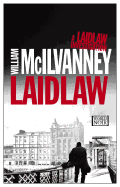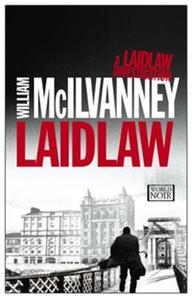

Glaswegian detective inspector Laidlaw is the quintessential hardened, hard-drinking cop. Sarcasm, problems at home and a prickly exterior belie a sensitive man who believes that his society bears some responsibility for every crime he investigates.
Laidlaw is approached by a thug he's dealt with before: Bud Lawson's daughter hasn't come home from the club, and Lawson wants Laidlaw's help. Where other cops hold Bud's criminal past against him, Laidlaw is willing to assist. For this case, he is partnered with the ambitious and impressionable young detective constable Harkness, who is meant to act as liaison between Laidlaw's unconventional tactics and the police establishment. Harkness is an excellent foil for Laidlaw's methods and worldview, and the growth and development of their relationship throughout is a satisfying side plot.
A murdered teenage girl does not, on the surface, look to be related to the network of thugs and gangsters that run Glasgow's criminal industry. But her killer--exposed to the reader early on--quickly becomes a pawn. Bud Lawson's gangster associates want him so they can exercise their revenge; other gangsters with other connections want him spirited safely out of town; and, of course, Laidlaw has his own goals--though, as he asks, "Who thinks the law has anything to do with justice?"
The phonetically spelled Scottish brogue adds color to dialogue, and McIlvanney's remarkable lyricism is surprisingly refined in this dark, coarse world ("She waited patiently for his head to come back from a walk around his guilt"). His strengths are both character and setting: Laidlaw is a complex individual, harder on himself than on anyone else, with an iconoclastic nature and difficulty with authority figures. The Glasgow McIlvanney evokes, rife with poverty and an unglamorous criminal underbelly, is absolutely compelling, and is a precursor to strong mystery settings like Michael Connelly's Los Angeles or James Lee Burke's Louisiana.
Laidlaw is not so much action-packed--although there is plenty of head-busting--as it is considered, psychological and concerned with the existential. McIlvanney has earned his reputation as the father of the "tartan noir" crime-writing genre that includes Ian Rankin, Denise Mina and Val McDermid. Readers will be glad to know that the next two books in this trilogy are set for re-release in late 2014. --Julia Jenkins
Shelf Talker: This literary Scottish noir mystery from the 1970s--heavy on character, setting and lyricism--lives up to its reputation in this reissue.

